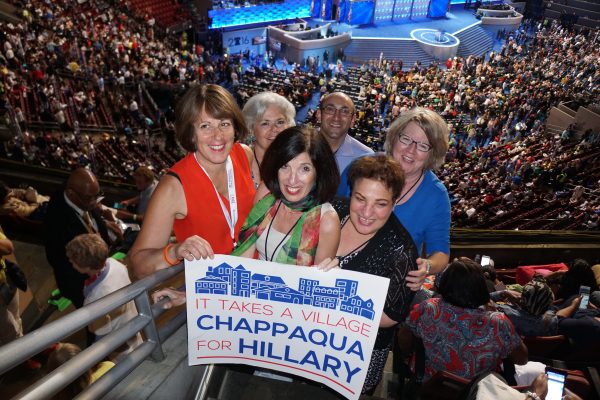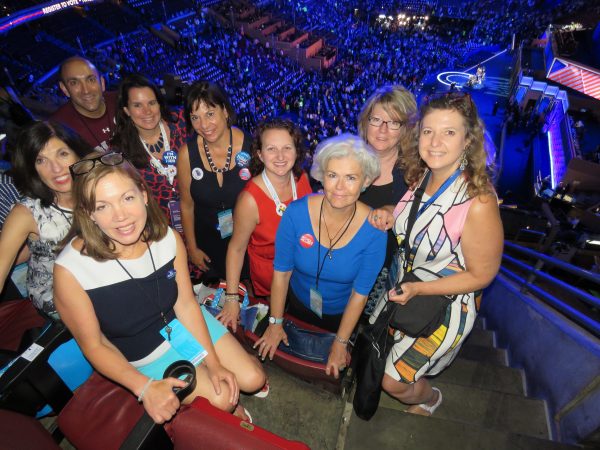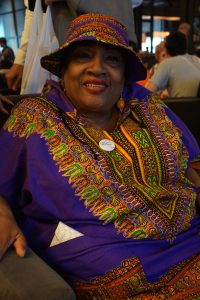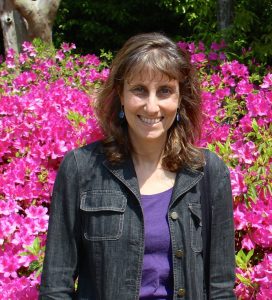Executive Women for Hillary Emphasizes “Curious, Creative and Collaborative” Listening
By Susan Youngwood
About 40 women crammed into the living room of a townhouse in Philadelphia last week, taking up every imaginable seating and floor space. All were eager to learn an effective method for persuading undecided voters to support Democratic presidential nominee Hillary Clinton.
“Our job is not to turn people who will happily vote for Donald Trump,” said Carol Evans, recent Chappaqua resident and a national co-chair of Executive Women for Hillary, who led this training. “Our job is to talk to independents, unenthusiastic Democrats and disaffected Republicans. Save your energy for the real fence sitters.”
Evans, who was founder and president of Working Mother Media, helped launch Executive Women for Hillary four months before Clinton declared her candidacy. “We started really early,” Evans explained. “We were just guessing and praying that she would run.”
Executive Women for Hillary is a national coalition of executive, entrepreneur and professional women who stand behind, support and advocate for Clinton to become the first woman president of the United States. It has about 1,450 members, all volunteer.
“We think that using our skills, networks and influence on getting Hillary elected is a winning formula,” Evans said. They call their approach Winning Hearts and Minds.
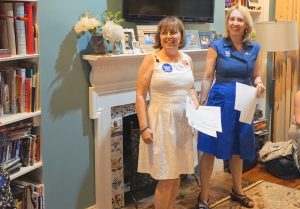
“We found our voice very early on” by focusing on training methodology that they rewrote for the Clinton campaign,, said Evans. “Like all executive women, we created a powerpoint.”
The group calls its training sessions salons, and they are usually held in someone’s private home. The one in Philadelphia during the Democratic National Convention was a typical gathering — it started with a social hour, as women chatted over cheese, crackers and cookies. After the group moved from the kitchen to the living room, the training began.
“The best thing is to start with an open-ended question,” Evans began. Ask, ‘How are you feeling about Hillary?’ You’ll get a lot of different responses.”
The most likely response is either ambivalence or negativity. The next step is to ask the person to talk about his or her concerns — and the key is to listen.
“Listening is not active,” instructed co-founder and national co-chair Jennifer Allyn, head of diversity for Price Waterhouse. “It’s curious, creative, collaborative.” Don’t interrupt, don’t disagree, don’t discuss their concerns one-by-one — just listen and be curious.
Then, engage them in a conversation by asking a lot of questions — questions that begin with either who, what, when, where, why or how. If the person is worried that Clinton isn’t trustworthy, ask, ‘Who do you trust? Why do you trust them. What qualities make someone trustworthy? How has trust been a factor in the past in your voting decisions? What is the one thing you do trust about Hillary?’”
“By asking those questions you are building a relationship – even if only for five minutes,” Evans said.
Then, pivot–explain why you are supporting Hillary. And finally, ask them their concerns about Donald Trump.
The goal is not to convince someone to love Hillary, but to get them to support her in November. “It’s a one-on-one game to get people to vote for Clinton,” said Evans.
This method works, said women who used it effectively in the primaries.
“I did this on my mother — who never voted Democrat in her life,” said Allyn. Allyn listened to her mother’s concerns, explained why she liked Hillary and was concerned about Trump, and convinced her mother to commit to vote for Clinton. “She even gave money!” Allyn added.
Mosemarie Boyd, an attorney from Arkansas, attended the Philadelphia session. “I met these women in Iowa in January,” she said, and signed up, becoming the co-chair for Ohio. “It brings in talented women who are top in their careers and teaches them to engage in the political process.”
The training is concise, which is attractive to women busy holding down jobs and raising families. Women busy. It also works to women’s strengths. “The most important part is to listen,” she explained.
Lisa Levey, the New Hampshire co-chair, is an organizational development consultant who has never been politically active before. The historic nature of Clinton’s campaign is a big motivating factor for her. “This is a huge deal; I can’t tell you how much that inspires me.”
She plans to organize movie screenings and debate parties for Executive Women in New Hampshire, and organize phone banks and canvassing. The key to this strategy, she said, “is understanding what the other person cares about.”
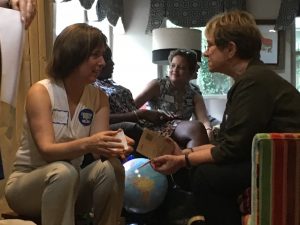
Twenty-eight members traveled to Philadelphia to attend the DNC, coming from around the country — Oklahoma, New Jersey, California, Washington, Virginia, to name a few places. The group plans to hold training salons in all 50 states (“We have a 50-state strategy,” Evans said), offer voter protection advice from its lawyer members, work on voter access and voter registration, and getting out the vote.
For more information on Executive Women for Hillary, go to www.executivewomenforhillary.com and follow them on Facebook, www.facebook.com/ExecutiveWomenforHillary/
